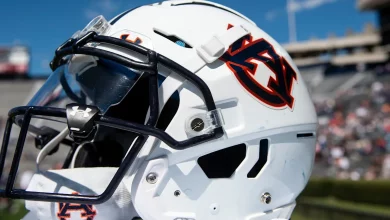Al Wilson, captain of Tennessee’s 1998 national championship team, became a star linebacker for the Denver Broncos, showcasing leadership, talent, and a significant impact in the NFL.

Al Wilson’s story is one of perseverance, leadership, and excellence. As a key figure in one of Tennessee football’s most celebrated eras, he etched his name into the program’s history. His subsequent success in the NFL cemented his legacy as one of the most impactful linebackers of his generation. This essay traces his journey, exploring his rise from college star to NFL standout, highlighting his leadership qualities, athletic talent, and lasting influence on the game.
Early Life and College Career
Born in Mobile, Alabama, Al Wilson’s early life was marked by athletic talent and a desire to excel. Growing up in a competitive environment, he quickly distinguished himself as a formidable linebacker with a fierce work ethic and natural leadership qualities. His high school career at Murphy High School in Mobile drew attention from college recruiters nationwide.
Recruitment and Commitment to Tennessee
Wilson’s exceptional talent led him to the University of Tennessee, a program renowned for producing NFL-caliber linebackers and a tradition of strong defense. His decision to commit to Tennessee was driven by the program’s storied history and the opportunity to play under legendary coaches like Phillip Fulmer.
College Years and the 1998 National Championship
Wilson’s impact at Tennessee was immediate. As a freshman, he displayed extraordinary instincts and physicality, earning a starting role early in his college career. Over his four seasons (1995-1998), Wilson developed into one of the nation’s premier linebackers, combining speed, strength, and football intelligence.
The pinnacle of his college career came with the 1998 season, which culminated in Tennessee winning the national championship. The Volunteers’ defense was among the best in the nation, and Wilson was its heart and soul. His leadership on and off the field was pivotal in guiding the team through tough SEC battles and high-stakes bowl games.
In the 1998 season, Tennessee’s defense was suffocating, and Wilson’s role as captain was vital. His ability to read plays, make crucial tackles, and rally his teammates under pressure established him as a true leader. The culmination of their efforts was a dominant victory over Florida State in the Fiesta Bowl, securing Tennessee’s second national championship.
Wilson’s college career was distinguished by numerous awards and honors, including All-American selections, but it was his leadership and competitive spirit that truly defined his legacy at Tennessee.
Transition to the NFL: Draft and Early Career with the Denver Broncos
Following his collegiate success, Al Wilson declared for the NFL Draft, where his talent and leadership qualities made him a highly touted prospect. The Denver Broncos selected him in the first round of the 2001 NFL Draft, a testament to his potential at the professional level.
Draft Expectations and Initial Impact
Wilson entered the NFL with high expectations. The Broncos saw him as a cornerstone of their defense, capable of anchoring the linebacking corps for years to come. His rookie season demonstrated his readiness to contribute, showcasing his tackling ability, football IQ, and leadership potential.
Playing Style and Skills
Wilson’s playing style was characterized by relentless effort, physicality, and intelligence. His quick diagnosis of plays allowed him to be a step ahead of the offense, making crucial tackles and creating turnovers. His sideline-to-sideline speed and instinctual play earned him respect among teammates and opponents alike.
He was known for his ability to read passing routes, blitz effectively, and shed blocks with ease. Off the field, his leadership qualities made him a natural captain, inspiring younger players and setting a standard for professionalism.
Career Highlights and Contributions with the Denver Broncos
Al Wilson’s NFL career was marked by consistent excellence and leadership. Over his tenure with the Broncos, he became one of the league’s most respected linebackers, known for his tenacity and game intelligence.
Defensive Leadership and Impact
Wilson’s impact extended beyond individual statistics. He was the emotional leader of the Broncos’ defense, often rallying teammates during challenging moments. His presence on the field was intimidating to opponents, and his ability to make game-changing plays was a hallmark of his career.
Key Performances and Achievements
Throughout his NFL career, Wilson amassed over 700 tackles, demonstrating his consistency and durability. Notable highlights include:
Pro Bowl Selections: Wilson was selected to the Pro Bowl multiple times, recognizing him as one of the best at his position.
Leadership in Key Games: He played a vital role in many crucial games, including playoff battles, where his leadership was instrumental.
Defensive Schemes: Wilson thrived in the Broncos’ aggressive defensive schemes, often serving as a linebacker who could drop into coverage or blitz as needed.
Injuries and Resilience
Despite his success, Wilson’s career was hampered by injuries, particularly a serious neck injury in 2004 that ultimately led to his early retirement. His resilience in returning from injuries and maintaining high performance levels underscored his determination and professionalism.
Off-the-Field Leadership and Legacy
Al Wilson’s influence extended well beyond his on-field exploits. His leadership qualities, work ethic, and character made him a role model for teammates and aspiring players.
Leadership Traits
Wilson was known for his vocal presence in the locker room, his ability to motivate others, and his commitment to team success. He exemplified the qualities of a captain—leading by example, maintaining focus under pressure, and demonstrating unwavering dedication.
Community Involvement
Wilson was also active in community service, involved in youth outreach programs and charity events. His humility and commitment to giving back made him a respected figure in Denver and Tennessee communities.
Legacy and Honors
Although his NFL career was relatively short due to injuries, Wilson’s impact remains significant. He is remembered as one of the best linebackers of his era, with a reputation for leadership, toughness, and football intelligence.
In Tennessee, his contributions to the 1998 national championship team are celebrated as a defining moment in the school’s football history. His leadership and performance serve as a benchmark for future generations of Tennessee players.
Post-Retirement and Continued Influence
After retiring from professional football, Wilson has remained involved in the sport and community initiatives. He has pursued coaching, mentoring young athletes, and advocating for player safety, especially concerning neck and spine injuries.
His story is often used as an example of resilience—overcoming injuries and adversity to achieve greatness. Wilson’s leadership qualities continue to inspire players at all levels of football.
A Legacy of Leadership, Talent, and Impact
Al Wilson’s journey from a college football captain on Tennessee’s 1998 national championship team to a star linebacker in the NFL embodies dedication, resilience, and leadership. His career highlights the importance of character and effort in achieving excellence, both on and off the field.
Wilson’s impact transcends statistics; he is remembered for his fierce competitiveness, leadership qualities, and commitment to his teams and communities. His legacy serves as a testament to the power of perseverance, inspiring generations of players and fans alike.
In the annals of Tennessee football and Denver Broncos history, Al Wilson stands out as a symbol of what can be achieved through passion, hard work, and unwavering dedication to the game.









